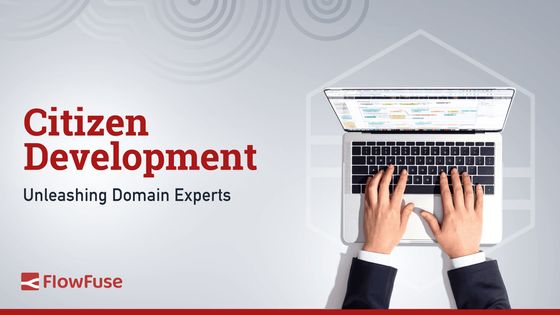Citizen Development: Unleashing Domain Experts
Why you should encourage domain experts to build applications

Citizen development has taken the spotlight recently, but the concept itself isn't entirely new. Remember the era of "hackers"? They weren't malicious actors, but individuals who tinkered with technology, pushing boundaries and creating solutions. Today, these same problem-solving personas have evolved into "citizen developers" – business users empowered to build applications without relying solely on professional coders.
Why Now?
While the drive for user-friendliness has always been present in programming languages, several factors have converged to push citizen development to the forefront:
- Democratization of Technology: Cloud computing and advancements in low-code/no-code platforms have lowered the barrier to entry, making development tools accessible to individuals with minimal technical expertise.
- Business Agility: The need for rapid innovation necessitates solutions that bypass lengthy IT backlogs. Citizen developers can bridge the gap, creating applications and internal tools quickly and efficiently.
- Domain Expertise: Business users possess deep insights into specific processes and challenges. By giving them the tools to build solutions, organizations can tap into a new knowledge source by putting domain experts into the driver's seat.
Beyond Spreadsheets: Platforms of Empowerment
Reports and Dashboards are often created by a BI teams that have to take information from specialists to create custom visualizations that may or may not come out to be exactly what they asked for. Queue old faiful, spreadsheets, where a domain expert can create their own reports that suit their needs. Spreadsheets are powerful for analysis, but they often lack the real-time secure connectivity needed for enterprise applications. Transform the knowledge created in a spreadsheet into a personalized real-time visualization. To do that, you must first select a citizen development platform and those platforms should offer:
- Visual Interfaces: Drag-and-drop functionality and pre-built components eliminate the need for complex coding, allowing users to focus on logic and functionality.
- Integration Capabilities: Seamless connection with existing data sources and systems ensures that citizen-built applications integrate seamlessly into the overall workflow. Plus, the ability to create custom integrations.
- Governance and Security: IT governance establishes guardrails while empowering users, ensuring data security and application stability through features like Role Based Access Control and SSO integration.
- Collaboration Tools: Built-in collaboration features enable teams to share ideas, iterate on solutions, and ensure knowledge transfer.
- Reseliency: Backup management.
Citizen Developers: Not Rube Goldberg Machines, But Value Creators
The key to successful citizen development lies in empowerment, not abdication. By providing the right tools, training, and governance, organizations can avoid creating complex, fragile solutions. Instead, citizen developers become powerful problem-solvers, building value-driven applications that address specific needs and contribute to overall business goals.
Lean In
Remember, citizen development isn't about replacing professional developers. It's about creating a collaborative environment where everyone can contribute their unique skills and perspectives. By removing the coding barrier, we unleash a wider pool of innovators, accelerating progress and driving organizational success.
Related Articles:
- Innovate from within - Why manufacturing must embrace Citizen Developers
- Modbus TCP vs Modbus RTU: Reliability, Latency, and Failure Modes
- Building an AI Vibration Anomaly Detector for Industrial Motors
- CAN Bus Tutorial: Connect to Dashboards, Cloud, and Industrial Systems
- FlowFuse 2.27: Integrated Editor in Remote Instances & Context-Aware FlowFuse Expert